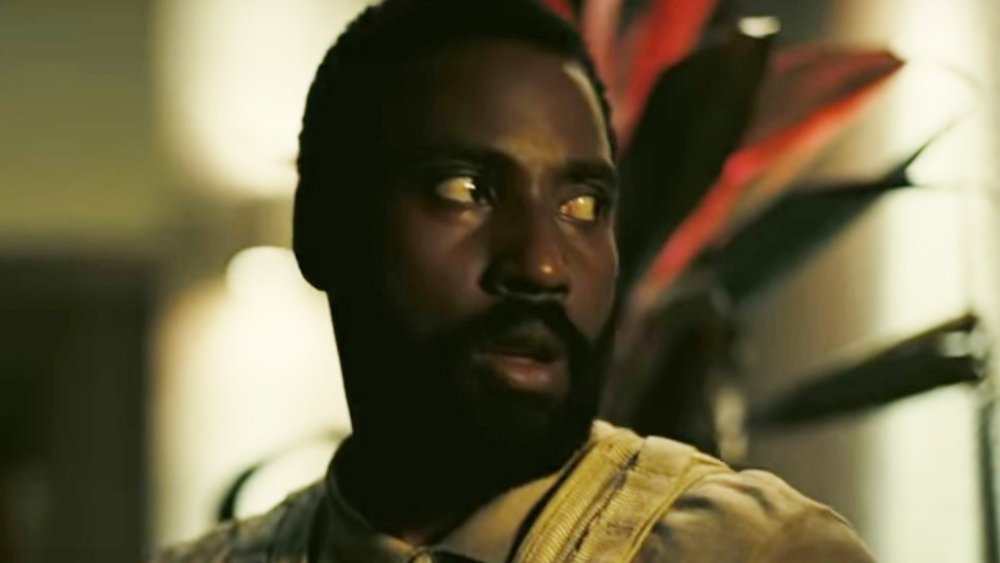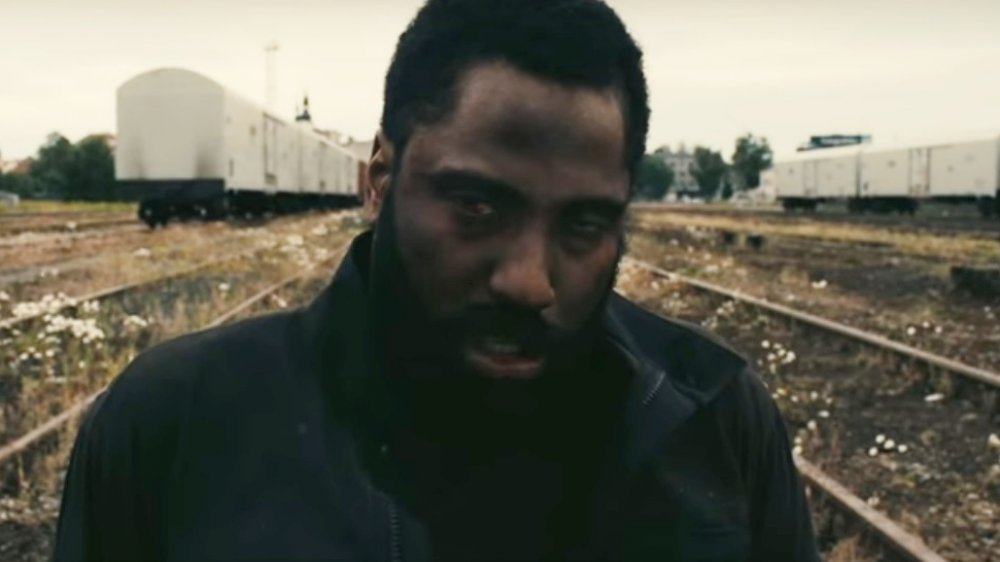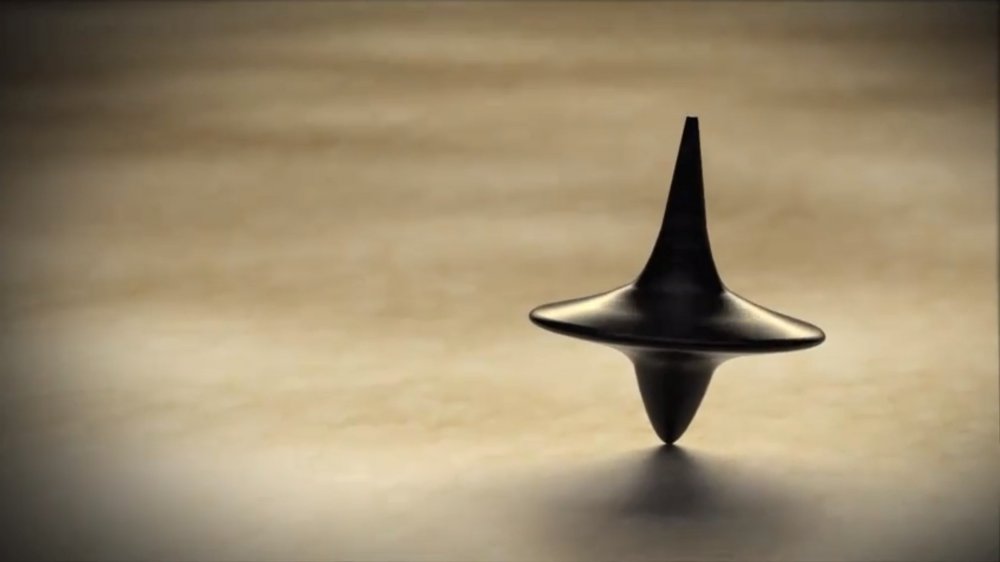Is Tenet A Secret Sequel To Inception?
The first full-length trailer for Christopher Nolan's next feature Tenet is finally here, and boy, does it ever raise more questions than it answers. When he's not making the best Batman movies anybody has ever made, we know what to expect from Nolan: the unexpected. More specifically, we know that the filmmaker will take us through a winding narrative in which the protagonist will never be exactly sure where he stands, and each small feint toward the truth will cause us to question the very nature of the story we're watching; also, we know that when the film ends, that's when the endless discussion will begin.
That Nolan's films don't come wrapped up with a bow on top is why we love them, and while we can say definitively that Tenet looks absolutely amazing, we still can't exactly tell you what it's about. What we can say, though, is that we noticed a couple of situations and themes that seem to have quite a lot in common with one of Nolan's greatest works: Inception, a movie that still inspires conversation and analysis nearly a decade after its release. So strong are these similarities, in fact, that we're ready to start the discussion around Tenet right now, with a simple but provocative question: is this film a sequel to Inception?
To be fair, we're not the first to have noticed a potential connection; The Hollywood Reporter put forth the possibility after the flick's first teaser trailer was released back in August. But this latest spot gives us a few more hints at a connection — and we think it's safe to say that if Nolan were to make a sequel to one of his original films, he'd do it in a way that no filmmaker has ever done before, and it would probably look a heck of a lot like this.
Could Tenet rewrite Inception's story?
Inception constantly played with the concept that what we thought we were watching may not have been what we were really watching, and likewise, that its characters may have been navigating entirely different circumstances than they thought they were. Examples of this are too numerous to list here, but for our purposes, let's focus on one: the dream world which was shared by Cobb (Leonardo DiCaprio) and his wife Mal (Marion Cotillard).
Midway through the film, Cobb recounts to his "dream architect" Ariadne (Ellen Page) how — while experimenting with the tech which enabled them to build a common, shared dream world from their memories — he and Mal ended up spending 50 years in this world in the space of only a handful of hours in real time. They both, to an extent, became lost — but Cobb had a solution. He convinced Mal successfully that they needed to kill themselves in the dream in order to return to reality, which they did by lying their heads upon a train track and waiting for the oncoming train.
The gambit worked — but problematically, once they returned to the real world, Mal refused to believe it actually was real. Convinced that she was still dreaming, Mal committed suicide, framing her husband for her death in an attempt to cause him to follow suit.
Could it actually be a mere coincidence, then, that the trailer for Tenet features an eerily similar circumstance? Early in the spot, we see the as-yet unnamed main character (John David Washington, BlacKkKlansman) engaging in some kind of stealth operation, infiltrating a tall building while equipped with a silenced pistol. We then see him in a train yard, looking quite like his entire world has just been turned upside-down.
"You chose to die instead of giving up your colleagues," a mysterious benefactor tells him in voiceover, as we see another individual forcing his head down onto the track. "That test you passed? Not everybody does," the voiceover continues, as we see Washington's character waking up in a hospital bed. He wakes fully, at which point we see the mystery man (portrayed by Kenneth Branagh), who tells him: "Welcome to the afterlife."
This seems like a bizarre re-staging of the event which forced Cobb and Mal from their slumber, and if it is intended to be, then it raises the question: if Washington's character is now in some kind of "afterlife," then where were Cobb and Mal when they emerged from their dream world? Sure, it doesn't exactly look like Washington's character is in a literal afterlife — but he may now be operating on some different plane of existence, as suggested later in the spot, as we see him seeming to glimpse into the future and even apparently rewinding time itself.
To our eye, it's all suggestive of the possibility that — if there is indeed a connection between Tenet and Inception — what appeared to be going on in the latter film may not really have been happening at all. Perhaps Cobb and company were similarly operating on a plane of existence they were unfamiliar with and had no frame of reference for, and the film's entire conceit of operatives who invade dream worlds to force effects in the real world was just one enormous red herring.
Seems a little out there, right? Who would make a film that completely rewrites the narrative of a beloved classic from a decade earlier in their filmography? We think you know how we'd answer that question, and while this is only one way in which Tenet and Inception could connect, we somehow find it to be one of the more likely possibilities.
We also find it intriguing that Washington's character is told that he's now apparently part of an organization which is being tasked with preventing World War III — not a nuclear war, but "something worse." He's then given a word by Branagh's character, a word which will "open the right doors, [and] some of the wrong ones, too." (The word, of course, is "tenet.") During all of this, we see things happening that don't appear to be possible — things happening in reverse, Washington's character apparently surviving a long fall, a crashed car becoming whole again. "You have to start looking at the world in a new way," Washington's character is told; could it be that this entire film takes place in a dream world, one which will cease to exist should the dreamer wake up?
If we know Christopher Nolan, and we think we do, this is the kind of "sequel" to Inception that we might expect — but then, it could also be that Tenet isn't exactly a sequel, but simply the next logical step in Nolan's oeuvre. It's a body of work which has long been fascinated with the slippery nature of reality, and with the medium of film itself as a reflection of this quality.
Could Tenet be more of a spiritual sequel to Inception?
It could be that we're not looking at an actual sequel to Inception, but one which follows in that flick's footsteps by similarly playing with the audience's perception. One of the most bizarre theories to emerge around Tenet is that the film will attempt a feat which one might think impossible. It's suggested by the trailer's multiple shots of events seeming to undo themselves, time running in reverse — and also by the film's very title, which is, of course, a palindrome.
That is, it's spelled the same backwards as it is forward. What if the movie itself is one long, cinematic palindrome? What if it, essentially or even literally, is the same backwards as it is forward — what would such a story look like?
In our opinion, it would look one hell of a lot like the story teased by this trailer. It's not like Nolan hasn't employed such a highly unconventional structure before; his sophomore feature Memento told its story in reverse while telling another (highly relevant yet separate) story in normal chronology with black-and-white scenes interspersed with the main narrative. If anybody could pull off a film that tells the same story when played in reverse as it does when played normally, it's Nolan, and probably only Nolan.
We would dive into exactly what such a structure would mean for the characters in the film and the world they inhabit, but frankly, all of this is threatening to break our brain. We have a feeling you feel the same way, and check it out — we've only been talking about the trailer for Tenet. Imagine what's going to happen to your poor, soft gourd when you actually see the whole movie.
Tenet is slated for release on July 17, 2020.


